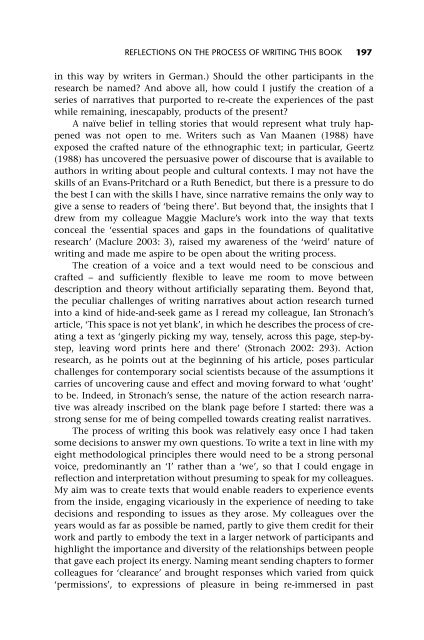Action Research A Methodology for Change and Development
Action Research A Methodology for Change and Development
Action Research A Methodology for Change and Development
Create successful ePaper yourself
Turn your PDF publications into a flip-book with our unique Google optimized e-Paper software.
REFLECTIONS ON THE PROCESS OF WRITING THIS BOOK 197<br />
in this way by writers in German.) Should the other participants in the<br />
research be named? And above all, how could I justify the creation of a<br />
series of narratives that purported to re-create the experiences of the past<br />
while remaining, inescapably, products of the present?<br />
A naïve belief in telling stories that would represent what truly happened<br />
was not open to me. Writers such as Van Maanen (1988) have<br />
exposed the crafted nature of the ethnographic text; in particular, Geertz<br />
(1988) has uncovered the persuasive power of discourse that is available to<br />
authors in writing about people <strong>and</strong> cultural contexts. I may not have the<br />
skills of an Evans-Pritchard or a Ruth Benedict, but there is a pressure to do<br />
the best I can with the skills I have, since narrative remains the only way to<br />
give a sense to readers of ‘being there’. But beyond that, the insights that I<br />
drew from my colleague Maggie Maclure’s work into the way that texts<br />
conceal the ‘essential spaces <strong>and</strong> gaps in the foundations of qualitative<br />
research’ (Maclure 2003: 3), raised my awareness of the ‘weird’ nature of<br />
writing <strong>and</strong> made me aspire to be open about the writing process.<br />
The creation of a voice <strong>and</strong> a text would need to be conscious <strong>and</strong><br />
crafted – <strong>and</strong> sufficiently flexible to leave me room to move between<br />
description <strong>and</strong> theory without artificially separating them. Beyond that,<br />
the peculiar challenges of writing narratives about action research turned<br />
into a kind of hide-<strong>and</strong>-seek game as I reread my colleague, Ian Stronach’s<br />
article, ‘This space is not yet blank’, in which he describes the process of creating<br />
a text as ‘gingerly picking my way, tensely, across this page, step-bystep,<br />
leaving word prints here <strong>and</strong> there’ (Stronach 2002: 293). <strong>Action</strong><br />
research, as he points out at the beginning of his article, poses particular<br />
challenges <strong>for</strong> contemporary social scientists because of the assumptions it<br />
carries of uncovering cause <strong>and</strong> effect <strong>and</strong> moving <strong>for</strong>ward to what ‘ought’<br />
to be. Indeed, in Stronach’s sense, the nature of the action research narrative<br />
was already inscribed on the blank page be<strong>for</strong>e I started: there was a<br />
strong sense <strong>for</strong> me of being compelled towards creating realist narratives.<br />
The process of writing this book was relatively easy once I had taken<br />
some decisions to answer my own questions. To write a text in line with my<br />
eight methodological principles there would need to be a strong personal<br />
voice, predominantly an ‘I’ rather than a ‘we’, so that I could engage in<br />
reflection <strong>and</strong> interpretation without presuming to speak <strong>for</strong> my colleagues.<br />
My aim was to create texts that would enable readers to experience events<br />
from the inside, engaging vicariously in the experience of needing to take<br />
decisions <strong>and</strong> responding to issues as they arose. My colleagues over the<br />
years would as far as possible be named, partly to give them credit <strong>for</strong> their<br />
work <strong>and</strong> partly to embody the text in a larger network of participants <strong>and</strong><br />
highlight the importance <strong>and</strong> diversity of the relationships between people<br />
that gave each project its energy. Naming meant sending chapters to <strong>for</strong>mer<br />
colleagues <strong>for</strong> ‘clearance’ <strong>and</strong> brought responses which varied from quick<br />
‘permissions’, to expressions of pleasure in being re-immersed in past

















